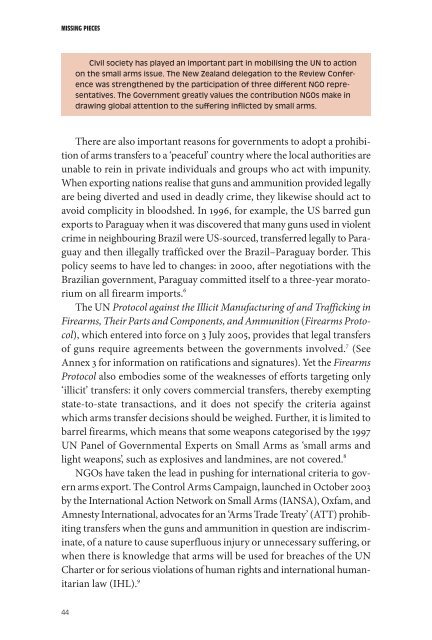MISSING PIECES - Inter-Parliamentary Union
MISSING PIECES - Inter-Parliamentary Union
MISSING PIECES - Inter-Parliamentary Union
Create successful ePaper yourself
Turn your PDF publications into a flip-book with our unique Google optimized e-Paper software.
<strong>MISSING</strong> <strong>PIECES</strong><br />
Civil society has played an important part in mobilising the UN to action<br />
on the small arms issue. The New Zealand delegation to the Review Conference<br />
was strengthened by the participation of three different NGO representatives.<br />
The Government greatly values the contribution NGOs make in<br />
drawing global attention to the suffering inflicted by small arms.<br />
There are also important reasons for governments to adopt a prohibition<br />
of arms transfers to a ‘peaceful’ country where the local authorities are<br />
unable to rein in private individuals and groups who act with impunity.<br />
When exporting nations realise that guns and ammunition provided legally<br />
are being diverted and used in deadly crime, they likewise should act to<br />
avoid complicity in bloodshed. In 1996, for example, the US barred gun<br />
exports to Paraguay when it was discovered that many guns used in violent<br />
crime in neighbouring Brazil were US-sourced, transferred legally to Paraguay<br />
and then illegally trafficked over the Brazil–Paraguay border. This<br />
policy seems to have led to changes: in 2000, after negotiations with the<br />
Brazilian government, Paraguay committed itself to a three-year moratorium<br />
on all firearm imports. 6<br />
The UN Protocol against the Illicit Manufacturing of and Trafficking in<br />
Firearms, Their Parts and Components, and Ammunition (Firearms Protocol),<br />
which entered into force on 3 July 2005, provides that legal transfers<br />
of guns require agreements between the governments involved. 7 (See<br />
Annex 3 for information on ratifications and signatures). Yet the Firearms<br />
Protocol also embodies some of the weaknesses of efforts targeting only<br />
‘illicit’ transfers: it only covers commercial transfers, thereby exempting<br />
state-to-state transactions, and it does not specify the criteria against<br />
which arms transfer decisions should be weighed. Further, it is limited to<br />
barrel firearms, which means that some weapons categorised by the 1997<br />
UN Panel of Governmental Experts on Small Arms as ‘small arms and<br />
light weapons’, such as explosives and landmines, are not covered. 8<br />
NGOs have taken the lead in pushing for international criteria to govern<br />
arms export. The Control Arms Campaign, launched in October 2003<br />
by the <strong>Inter</strong>national Action Network on Small Arms (IANSA), Oxfam, and<br />
Amnesty <strong>Inter</strong>national, advocates for an ‘Arms Trade Treaty’ (ATT) prohibiting<br />
transfers when the guns and ammunition in question are indiscriminate,<br />
of a nature to cause superfluous injury or unnecessary suffering, or<br />
when there is knowledge that arms will be used for breaches of the UN<br />
Charter or for serious violations of human rights and international humanitarian<br />
law (IHL). 9<br />
44
















